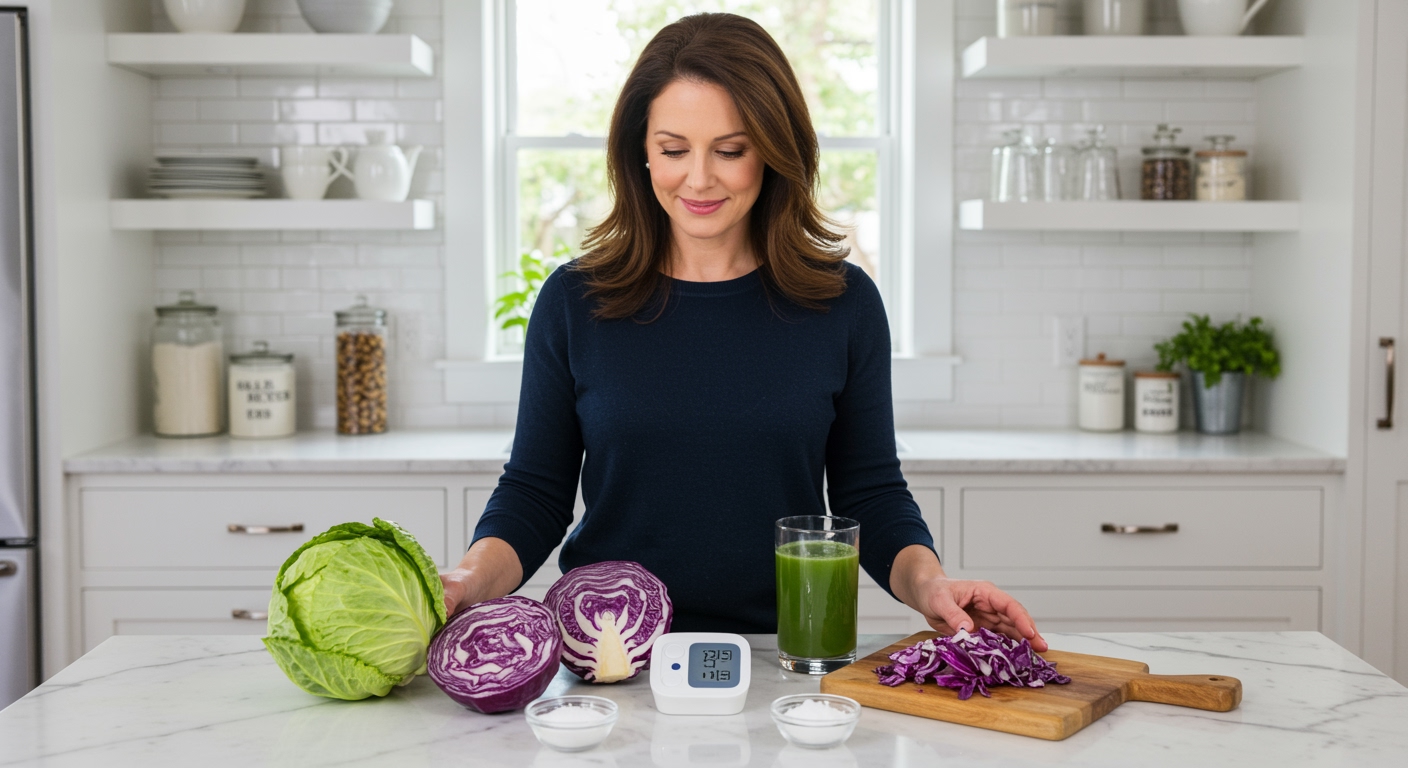✪ Key Takeaway: Cabbage may worsen low blood pressure due to its potassium content and natural compounds that can lower blood pressure further.
Introduction
You grab a head of cabbage at the grocery store and wonder if this crunchy vegetable will help or hurt your already low blood pressure.
Many people with hypotension worry about which foods might make their condition worse or leave them feeling dizzy and weak throughout the day.
Hi, I’m Abdur, your nutrition coach and today I’m going to explain exactly how cabbage affects low blood pressure and what you need to know before adding it to your meals.
How Does Cabbage Affect Blood Pressure Naturally?
Cabbage contains several natural compounds that can influence your cardiovascular system in ways that might concern people with low blood pressure.
The vegetable is packed with potassium, providing about 151 milligrams per cup of raw cabbage, which helps your body maintain fluid balance and supports proper muscle function.
Potassium works by counteracting sodium in your bloodstream, which typically leads to blood vessel relaxation and reduced pressure on artery walls.
Cabbage also contains nitrates, which your body converts into nitric oxide, a molecule that signals blood vessels to widen and allows blood to flow more easily.
These mechanisms work together to create a blood pressure lowering effect that could be problematic if your readings are already below normal ranges.
✪ Fact: One cup of cooked cabbage contains about 296 milligrams of potassium, nearly double the amount found in raw cabbage.
What Happens When You Eat Cabbage With Hypotension?
When you have low blood pressure and consume cabbage regularly, the potassium content may cause your already low readings to drop even further.
Your kidneys work to maintain electrolyte balance, but the additional potassium from cabbage can enhance the sodium-potassium pump activity in your cells.
This increased pump activity helps remove excess sodium from your bloodstream, which reduces blood volume and can make your hypotension symptoms more pronounced.
You might experience increased dizziness, fatigue, or lightheadedness after eating large portions of cabbage, especially if you consume it on an empty stomach.
The nitric oxide production from cabbage nitrates can also cause additional blood vessel dilation, making it harder for your cardiovascular system to maintain adequate pressure for proper circulation.
Some people with hypotension report feeling weak or experiencing brain fog after consuming cruciferous vegetables like cabbage in significant amounts.
✪ Pro Tip: Monitor your blood pressure readings before and after eating cabbage to track how your body responds individually.
Should You Avoid Cabbage Completely With Low Blood Pressure?
Complete avoidance of cabbage is not necessary for most people with low blood pressure, but portion control becomes crucial for managing your condition effectively.
Small servings of cabbage, about half a cup per meal, are unlikely to cause significant drops in blood pressure for most individuals with mild hypotension.
The key is understanding that cabbage provides valuable nutrients including vitamin C, vitamin K, and fiber that support overall health and should not be eliminated entirely.
You can balance the blood pressure lowering effects by combining cabbage with foods that contain natural sodium, such as celery or sea vegetables.
Cooking methods also matter because raw cabbage tends to have more concentrated active compounds compared to cooked versions, which may be gentler on your cardiovascular system.
Consider eating cabbage as part of a balanced meal rather than consuming it alone, as other foods can help moderate its blood pressure effects.
✪ Note: Fermented cabbage like sauerkraut contains additional sodium that may help counteract some blood pressure lowering effects.
What Are The Best Ways To Include Cabbage Safely?
Smart preparation methods can help you enjoy cabbage while minimizing its potential impact on your low blood pressure readings.
Steaming or lightly sautéing cabbage reduces some of the potassium concentration while making it easier for your digestive system to process the nutrients gradually.
Adding a pinch of sea salt while cooking can help balance the sodium-potassium ratio and prevent excessive blood pressure drops after eating.
Combining cabbage with protein sources like eggs, chicken, or fish helps slow down nutrient absorption and provides your body with amino acids needed for proper circulation.
Timing your cabbage consumption matters too, as eating it during main meals rather than as snacks gives your body more nutritional context to work with.
Consider alternating cabbage with other vegetables throughout the week rather than eating it daily, which allows your body time to adjust and maintain stable blood pressure levels.
✪ Pro Tip: Start with small portions and gradually increase to find your personal tolerance level without triggering symptoms.
The Bottom Line
Cabbage can potentially worsen low blood pressure due to its potassium content and natural compounds that promote blood vessel relaxation, but complete avoidance is not necessary for most people.
Smart nutrition means understanding how foods affect your unique body rather than following blanket rules that ignore individual health conditions.
I would love to hear about your experience with cabbage and low blood pressure, so please share your thoughts, questions, or personal stories in the comments below.
References
At NutritionCrown, we use quality and credible sources to ensure our content is accurate and trustworthy. Below are the sources referenced in creating this article:
- British Heart Foundation: Cruciferous Vegetables
- Cleveland Clinic: Benefits of Cabbage
- Brown Health: Cabbage and Benefits Overlooked Superfood
- Healthline: Benefits of Cabbage





